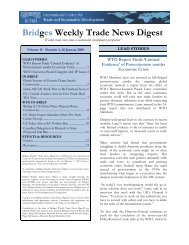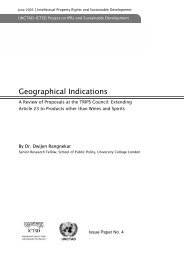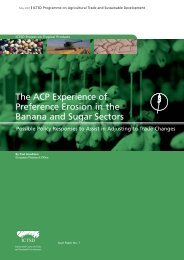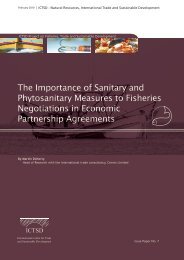- Page 4 and 5:
iiiContentsAcknowledgementsForeword
- Page 6 and 7:
Section v - marker-assisted selecti
- Page 8 and 9:
viiForewordSince almost the beginni
- Page 10 and 11:
ixAbbreviations and acronymsAATFAB-
- Page 12 and 13:
xiFIVIMSFNPFSCFSILGABIGASGCAGCPGDPG
- Page 14 and 15:
xiiiOBMOECDOIEOPVPAGEPBRsPCRPGRFAPI
- Page 16 and 17:
xvContributorsAmalia BaroneProfesso
- Page 18 and 19:
xviiElcio Perpétuo GuimarãesSenio
- Page 20:
xixAndrea SonninoSenior Agricultura
- Page 24 and 25:
Chapter 1Marker-assisted selection
- Page 26 and 27:
Chapter 1 - An overview of the issu
- Page 28 and 29:
Chapter 1 - An overview of the issu
- Page 30 and 31:
Chapter 1 - An overview of the issu
- Page 32 and 33:
Chapter 1 - An overview of the issu
- Page 34:
Chapter 1 - An overview of the issu
- Page 37 and 38:
16Marker-assisted selection - Curre
- Page 39 and 40:
18Marker-assisted selection - Curre
- Page 41 and 42:
20Marker-assisted selection - Curre
- Page 43 and 44:
22Marker-assisted selection - Curre
- Page 45 and 46:
24Marker-assisted selection - Curre
- Page 47 and 48:
26Marker-assisted selection - Curre
- Page 50 and 51:
Chapter 3Molecular markers for use
- Page 52 and 53:
Chapter 3 - Molecular markers for u
- Page 54 and 55:
Chapter 3 - Molecular markers for u
- Page 56 and 57:
Chapter 3 - Molecular markers for u
- Page 58 and 59:
Chapter 3 - Molecular markers for u
- Page 60 and 61:
Chapter 3 - Molecular markers for u
- Page 62 and 63:
Chapter 3 - Molecular markers for u
- Page 64 and 65:
Chapter 3 - Molecular markers for u
- Page 66 and 67:
Chapter 3 - Molecular markers for u
- Page 68 and 69:
Chapter 3 - Molecular markers for u
- Page 70:
Chapter 3 - Molecular markers for u
- Page 73 and 74:
52Marker-assisted selection - Curre
- Page 75 and 76:
54Marker-assisted selection - Curre
- Page 77 and 78:
56Marker-assisted selection - Curre
- Page 79 and 80:
58Marker-assisted selection - Curre
- Page 81 and 82:
60Marker-assisted selection - Curre
- Page 83 and 84:
62Marker-assisted selection - Curre
- Page 85 and 86:
64Marker-assisted selection - Curre
- Page 88 and 89:
Chapter 6Targeted introgression of
- Page 90 and 91:
Chapter 6 - Targeted introgression
- Page 92 and 93:
Chapter 6 - Targeted introgression
- Page 94 and 95:
Chapter 6 - Targeted introgression
- Page 96 and 97:
Chapter 6 - Targeted introgression
- Page 98 and 99:
Chapter 6 - Targeted introgression
- Page 100 and 101:
Chapter 6 - Targeted introgression
- Page 102 and 103:
Chapter 7Marker-assisted selection
- Page 104 and 105:
Chapter 7 - Marker-assisted selecti
- Page 106 and 107:
Chapter 7 - Marker-assisted selecti
- Page 108 and 109:
Chapter 7 - Marker-assisted selecti
- Page 110 and 111:
Chapter 7 - Marker-assisted selecti
- Page 112 and 113:
Chapter 7 - Marker-assisted selecti
- Page 114 and 115:
Chapter 7 - Marker-assisted selecti
- Page 116 and 117:
Chapter 7 - Marker-assisted selecti
- Page 118 and 119:
Chapter 7 - Marker-assisted selecti
- Page 120 and 121:
Chapter 7 - Marker-assisted selecti
- Page 122 and 123:
Chapter 7 - Marker-assisted selecti
- Page 124 and 125:
Chapter 7 - Marker-assisted selecti
- Page 126 and 127:
Chapter 7 - Marker-assisted selecti
- Page 128 and 129:
Chapter 7 - Marker-assisted selecti
- Page 130 and 131:
Chapter 7 - Marker-assisted selecti
- Page 132 and 133:
Chapter 7 - Marker-assisted selecti
- Page 134 and 135:
Chapter 7 - Marker-assisted selecti
- Page 136:
Chapter 7 - Marker-assisted selecti
- Page 139 and 140:
118Marker-assisted selection - Curr
- Page 141 and 142:
120Marker-assisted selection - Curr
- Page 143 and 144:
122Marker-assisted selection - Curr
- Page 145 and 146:
124Marker-assisted selection - Curr
- Page 147 and 148:
126Marker-assisted selection - Curr
- Page 149 and 150:
128Marker-assisted selection - Curr
- Page 151 and 152:
130Marker-assisted selection - Curr
- Page 153 and 154:
132Marker-assisted selection - Curr
- Page 155 and 156:
134Marker-assisted selection - Curr
- Page 157 and 158:
136Marker-assisted selection - Curr
- Page 159 and 160:
138Marker-assisted selection - Curr
- Page 161 and 162:
140Marker-assisted selection - Curr
- Page 163 and 164:
142Marker-assisted selection - Curr
- Page 165 and 166:
144Marker-assisted selection - Curr
- Page 167 and 168:
146Marker-assisted selection - Curr
- Page 169 and 170:
148Marker-assisted selection - Curr
- Page 171 and 172:
150Marker-assisted selection - Curr
- Page 173 and 174:
152Marker-assisted selection - Curr
- Page 175 and 176:
154Marker-assisted selection - Curr
- Page 177 and 178:
156Marker-assisted selection - Curr
- Page 179 and 180:
158Marker-assisted selection - Curr
- Page 181 and 182:
160Marker-assisted selection - Curr
- Page 183 and 184:
162Marker-assisted selection - Curr
- Page 185 and 186:
164Marker-assisted selection - Curr
- Page 188 and 189:
Chapter 10Strategies, limitations a
- Page 190 and 191:
Chapter 10 - Strategies, limitation
- Page 192 and 193:
Chapter 10 - Strategies, limitation
- Page 194 and 195:
Chapter 10 - Strategies, limitation
- Page 196 and 197:
Chapter 10 - Strategies, limitation
- Page 198 and 199:
Chapter 10 - Strategies, limitation
- Page 200 and 201:
Chapter 10 - Strategies, limitation
- Page 202 and 203:
Chapter 10 - Strategies, limitation
- Page 204 and 205:
Chapter 10 - Strategies, limitation
- Page 206 and 207:
Chapter 11Marker-assisted selection
- Page 208 and 209:
Chapter 11 - Marker-assisted select
- Page 210 and 211:
Chapter 11 - Marker-assisted select
- Page 212 and 213:
Chapter 11 - Marker-assisted select
- Page 214 and 215:
Chapter 11 - Marker-assisted select
- Page 216 and 217:
Chapter 11 - Marker-assisted select
- Page 218 and 219:
Chapter 11 - Marker-assisted select
- Page 220 and 221:
Chapter 12Marker-assisted selection
- Page 222 and 223:
Chapter 12 - Marker-assisted select
- Page 224 and 225:
Chapter 12 - Marker-assisted select
- Page 226 and 227:
Chapter 12 - Marker-assisted select
- Page 228 and 229:
Chapter 12 - Marker-assisted select
- Page 230 and 231:
Chapter 12 - Marker-assisted select
- Page 232 and 233:
Chapter 12 - Marker-assisted select
- Page 234 and 235:
Chapter 12 - Marker-assisted select
- Page 236 and 237:
Chapter 12 - Marker-assisted select
- Page 238 and 239:
Chapter 12 - Marker-assisted select
- Page 240 and 241:
Chapter 12 - Marker-assisted select
- Page 242 and 243:
Chapter 12 - Marker-assisted select
- Page 244 and 245:
Chapter 12 - Marker-assisted select
- Page 246 and 247:
Chapter 12 - Marker-assisted select
- Page 248 and 249:
Chapter 12 - Marker-assisted select
- Page 250 and 251:
Chapter 13Marker-assisted selection
- Page 252 and 253:
Chapter 13 - Marker-assisted select
- Page 254 and 255:
Chapter 13 - Marker-assisted select
- Page 256 and 257:
Chapter 13 - Marker-assisted select
- Page 258 and 259:
Chapter 13 - Marker-assisted select
- Page 260 and 261:
Chapter 13 - Marker-assisted select
- Page 262 and 263:
Chapter 13 - Marker-assisted select
- Page 264 and 265:
Chapter 13 - Marker-assisted select
- Page 266 and 267:
Chapter 13 - Marker-assisted select
- Page 268:
Chapter 13 - Marker-assisted select
- Page 272 and 273:
Chapter 14Marker-assisted selection
- Page 274 and 275:
Chapter 14 - Marker-assisted select
- Page 276 and 277:
Chapter 14 - Marker-assisted select
- Page 278 and 279:
Chapter 14 - Marker-assisted select
- Page 280 and 281:
Chapter 14 - Marker-assisted select
- Page 282 and 283:
Chapter 14 - Marker-assisted select
- Page 284 and 285:
Chapter 14 - Marker-assisted select
- Page 286 and 287:
Chapter 14 - Marker-assisted select
- Page 288 and 289:
Chapter 14 - Marker-assisted select
- Page 290 and 291:
Chapter 14 - Marker-assisted select
- Page 292 and 293:
Chapter 14 - Marker-assisted select
- Page 294 and 295:
Chapter 14 - Marker-assisted select
- Page 296 and 297:
Chapter 14 - Marker-assisted select
- Page 298 and 299:
Chapter 14 - Marker-assisted select
- Page 300 and 301:
Chapter 14 - Marker-assisted select
- Page 302:
Chapter 14 - Marker-assisted select
- Page 305 and 306:
284Marker-assisted selection - Curr
- Page 307 and 308:
286Marker-assisted selection - Curr
- Page 309 and 310:
288Marker-assisted selection - Curr
- Page 311 and 312:
290Marker-assisted selection - Curr
- Page 313 and 314:
292Marker-assisted selection - Curr
- Page 315 and 316:
294Marker-assisted selection - Curr
- Page 317 and 318:
296Marker-assisted selection - Curr
- Page 319 and 320:
298Marker-assisted selection - Curr
- Page 321 and 322:
300Marker-assisted selection - Curr
- Page 323 and 324:
302Marker-assisted selection - Curr
- Page 325 and 326:
304Marker-assisted selection - Curr
- Page 328:
Section VMarker-assisted selectioni
- Page 331 and 332:
310Marker-assisted selection - Curr
- Page 333 and 334:
312Marker-assisted selection - Curr
- Page 335 and 336:
314Marker-assisted selection - Curr
- Page 337 and 338:
316Marker-assisted selection - Curr
- Page 339 and 340:
318Marker-assisted selection - Curr
- Page 341 and 342:
320Marker-assisted selection - Curr
- Page 343 and 344:
322Marker-assisted selection - Curr
- Page 345 and 346:
324Marker-assisted selection - Curr
- Page 347 and 348:
326Marker-assisted selection - Curr
- Page 349 and 350:
328Marker-assisted selection - Curr
- Page 351 and 352:
330Marker-assisted selection - Curr
- Page 353 and 354:
332Marker-assisted selection - Curr
- Page 355 and 356:
334Marker-assisted selection - Curr
- Page 357 and 358:
336Marker-assisted selection - Curr
- Page 359 and 360:
338Marker-assisted selection - Curr
- Page 361 and 362:
340Marker-assisted selection - Curr
- Page 363 and 364:
342Marker-assisted selection - Curr
- Page 365 and 366:
344Marker-assisted selection - Curr
- Page 367 and 368:
346Marker-assisted selection - Curr
- Page 369 and 370:
348Marker-assisted selection - Curr
- Page 371 and 372:
350Marker-assisted selection - Curr
- Page 373 and 374:
352Marker-assisted selection - Curr
- Page 375 and 376:
354Marker-assisted selection - Curr
- Page 377 and 378:
356Marker-assisted selection - Curr
- Page 379 and 380:
358Marker-assisted selection - Curr
- Page 381 and 382:
360Marker-assisted selection - Curr
- Page 383 and 384:
362Marker-assisted selection - Curr
- Page 386 and 387:
Chapter 18Marker-assisted selection
- Page 388 and 389:
Chapter 18 - Marker-assisted select
- Page 390 and 391:
Chapter 18 - Marker-assisted select
- Page 392 and 393:
Chapter 18 - Marker-assisted select
- Page 394 and 395:
Chapter 18 - Marker-assisted select
- Page 396 and 397:
Chapter 18 - Marker-assisted select
- Page 398 and 399:
Chapter 18 - Marker-assisted select
- Page 400 and 401: Chapter 18 - Marker-assisted select
- Page 402 and 403: Chapter 19Technical, economic and p
- Page 404 and 405: Chapter 19 - Technical, economic an
- Page 406 and 407: Chapter 19 - Technical, economic an
- Page 408 and 409: Chapter 19 - Technical, economic an
- Page 410 and 411: Chapter 19 - Technical, economic an
- Page 412 and 413: Chapter 19 - Technical, economic an
- Page 414 and 415: Chapter 19 - Technical, economic an
- Page 416 and 417: Chapter 19 - Technical, economic an
- Page 418 and 419: Chapter 19 - Technical, economic an
- Page 420 and 421: Chapter 19 - Technical, economic an
- Page 422 and 423: Chapter 19 - Technical, economic an
- Page 424 and 425: Chapter 19 - Technical, economic an
- Page 426 and 427: Chapter 20Impacts of intellectual p
- Page 428 and 429: Chapter 20 - Impacts of intellectua
- Page 430 and 431: Chapter 20 - Impacts of intellectua
- Page 432 and 433: Chapter 20 - Impacts of intellectua
- Page 434 and 435: Chapter 20 - Impacts of intellectua
- Page 436 and 437: Chapter 20 - Impacts of intellectua
- Page 438 and 439: Chapter 20 - Impacts of intellectua
- Page 440 and 441: Chapter 20 - Impacts of intellectua
- Page 442 and 443: Chapter 20 - Impacts of intellectua
- Page 444 and 445: Chapter 20 - Impacts of intellectua
- Page 446: Chapter 20 - Impacts of intellectua
- Page 449: 428Marker-assisted selection - Curr
- Page 453 and 454: 432Marker-assisted selection - Curr
- Page 455 and 456: 434Marker-assisted selection - Curr
- Page 457 and 458: 436Marker-assisted selection - Curr
- Page 459 and 460: 438Marker-assisted selection - Curr
- Page 461 and 462: 440Marker-assisted selection - Curr
- Page 463 and 464: 442Marker-assisted selection - Curr
- Page 465 and 466: 444Marker-assisted selection - Curr
- Page 467 and 468: 446Marker-assisted selection - Curr
- Page 469 and 470: 448Marker-assisted selection - Curr
- Page 471 and 472: 450Marker-assisted selection - Curr
- Page 473 and 474: 452Marker-assisted selection - Curr
- Page 475 and 476: 454Marker-assisted selection - Curr
- Page 477 and 478: 456Marker-assisted selection - Curr
- Page 479 and 480: 458Marker-assisted selection - Curr
- Page 481 and 482: 460Marker-assisted selection - Curr
- Page 483 and 484: 462Marker-assisted selection - Curr
- Page 485 and 486: 464Marker-assisted selection - Curr
- Page 487 and 488: 466Marker-assisted selection - Curr
- Page 489 and 490: 468Marker-assisted selection - Curr
- Page 491 and 492: 470Marker-assisted selection - Curr
- Page 494: This book provides a comprehensive









